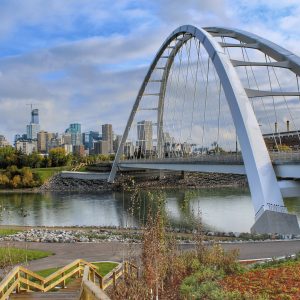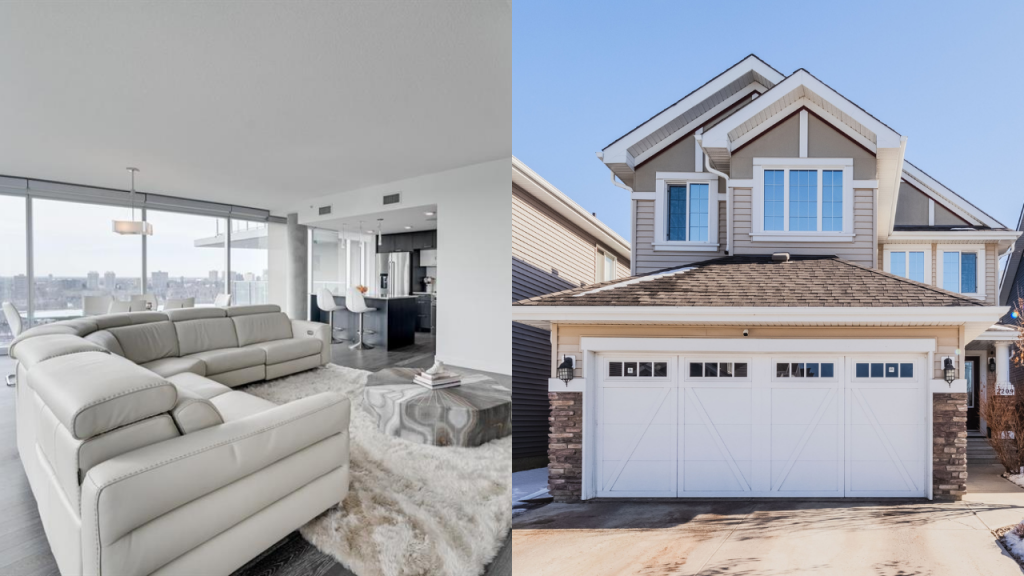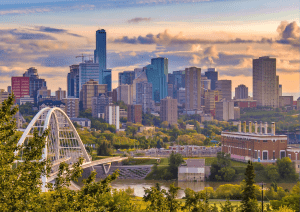
Moving to a new city can be overwhelming, especially when it comes to finding the right neighborhood, understanding the local housing market, and navigating essential services. Our guide for newcomers moving to Edmonton is designed to ease your transition, providing you with the crucial information you need.
Newcomers moving to Edmonton should have information on the diverse housing options, ranging from affordable condos to family-friendly homes, popular neighborhoods, such as Old Strathcona and Westmount, offering unique amenities, essential services, including healthcare, public transportation, and schools, the local real estate market trends; and key tips for settling into Edmonton’s lifestyle and culture.
There’s so much more to explore when moving to Edmonton, from finding the best neighborhoods for your lifestyle to understanding the city’s real estate landscape. Keep reading to discover how you can make your move to Edmonton as smooth and successful as possible.
Moving to Edmonton: What You Need to Know
Moving to a new city can be overwhelming, especially when it comes to finding the right neighborhood, understanding the local housing market, and navigating essential services. Our guide for newcomers moving to Edmonton is designed to ease your transition, providing you with the crucial information you need.
Finding Your Perfect Home in Edmonton
When moving to Edmonton, one of the first decisions you’ll face is choosing the right home. Edmonton offers a wide range of housing options, from modern condos in the downtown core to family-friendly homes in suburban neighborhoods. The city’s diverse housing market ensures there’s something for everyone, whether you’re a young professional, a growing family, or a retiree looking for a quiet place to settle down.
Condos are particularly popular for those looking for low-maintenance living with amenities like gyms, pools, and security. For example, areas like the Ice District and Oliver offer contemporary condos close to work, entertainment, and dining options. On the other hand, if you’re looking for a more spacious home, neighborhoods like Terwillegar and Windermere offer beautiful single-family homes with large yards, perfect for families with children or pets.
Before making a decision, consider what type of property suits your lifestyle best. Do you prefer the hustle and bustle of downtown living, or do you crave the peace and space of a suburban neighborhood? Understanding your preferences will help narrow down your options and make your move to Edmonton smoother.
Exploring Edmonton’s Neighborhoods: Where Will You Call Home?
Choosing the right neighborhood is crucial when moving to Edmonton. The city is known for its distinct neighborhoods, each offering a unique blend of amenities, community vibes, and accessibility. Whether you’re looking for a vibrant urban experience or a quiet suburban retreat, Edmonton has a neighborhood that will feel like home.
Old Strathcona
If you enjoy a lively atmosphere with plenty of shops, restaurants, and cultural events, Old Strathcona is a perfect choice. This neighborhood is home to Whyte Avenue, known for its eclectic mix of boutiques, coffee shops, and nightlife. It’s also close to the University of Alberta, making it a popular spot for students and young professionals.
Westmount
For those who appreciate historic charm, Westmount offers a mix of heritage homes and modern developments. This neighborhood is ideal for families and professionals who want to be close to downtown but still enjoy the tranquility of tree-lined streets and parks.
Windermere
Located in the southwest of the city, Windermere is one of Edmonton’s most sought-after neighborhoods. It’s perfect for those seeking luxury living with easy access to golf courses, shopping centers, and top-rated schools. The area’s modern homes and well-planned community spaces make it a favorite for families and executives.
When selecting a neighborhood, consider factors such as proximity to work, schools, and amenities like grocery stores and parks. Each neighborhood in Edmonton offers something different, so take the time to explore and find the one that best fits your needs.
Essential Services in Edmonton: What You Need to Know
Moving to Edmonton means getting familiar with the city’s essential services, which are crucial for making your transition as seamless as possible. Access to quality healthcare, reliable public transportation, and good schools are top priorities for most newcomers.
Healthcare
Edmonton is home to several world-class healthcare facilities, including the University of Alberta Hospital and the Royal Alexandra Hospital. These institutions offer a wide range of services, from emergency care to specialized treatments. It’s essential to register with Alberta Health Services as soon as you move to ensure you can access medical care when needed.
Public Transportation
The Edmonton Transit Service (ETS) provides an extensive network of buses and LRT (Light Rail Transit) lines, making it easy to navigate the city without a car. The LRT is especially convenient for commuting to downtown and the University of Alberta. If you plan to use public transportation frequently, consider purchasing a monthly pass for unlimited rides.
Schools
For families with children, Edmonton offers a variety of schooling options, including public, Catholic, and private schools. The Edmonton Public School Board and the Edmonton Catholic School District manage most of the city’s schools, which are known for their high academic standards and extracurricular activities. Researching school catchment areas can help you choose a neighborhood that aligns with your educational preferences.
By understanding and utilizing these essential services, you can ensure that your move to Edmonton is not only smooth but also well-supported.
Moving to Edmonton: Understanding the Local Real Estate Market
The Edmonton real estate market is dynamic, with trends that can significantly impact your buying or renting decisions. Understanding these trends will give you an edge when moving to Edmonton and looking for a property.
Currently, Edmonton’s real estate market is characterized by affordability and steady growth. Home prices are relatively lower compared to other major Canadian cities like Vancouver or Toronto, making Edmonton an attractive option for first-time buyers and investors alike. The market is diverse, offering everything from starter homes to luxury properties.
If you’re considering buying a home, it’s essential to work with a local real estate agent who understands the nuances of the Edmonton market. They can provide valuable insights into the best times to buy, emerging neighborhoods, and potential investment opportunities. Renting is also a viable option, with plenty of rental properties available across the city, catering to different budgets and preferences.
Embracing Edmonton’s Lifestyle and Culture
Moving to Edmonton isn’t just about finding a home; it’s about embracing a new lifestyle and culture. Edmonton is known for its vibrant arts scene, diverse dining options, and year-round festivals, making it a city where there’s always something to do.
One of the highlights of Edmonton’s cultural scene is the Edmonton International Fringe Festival, the largest and oldest Fringe Theatre festival in North America. For food lovers, the city offers a diverse culinary landscape, from farm-to-table dining experiences to international cuisine. The Whyte Avenue area, in particular, is a hotspot for trendy eateries and unique dining experiences.
Edmonton is also a city that embraces the outdoors. With the North Saskatchewan River Valley, the largest urban park in Canada, residents have access to extensive walking, biking, and hiking trails. In the winter, the city transforms into a snowy playground, with opportunities for skiing, snowshoeing, and ice skating.
As you settle into your new home, take the time to explore these aspects of Edmonton’s lifestyle and culture. Engaging with the community and participating in local events will help you feel more connected to your new city.
FAQ: What is the weather like in Edmonton, and how should newcomers prepare for it?
Edmonton experiences a continental climate with distinct seasons. Winters are cold, with temperatures often dropping below -15°C, and snowfall is common from November through March. Summers, on the other hand, are warm and pleasant, with temperatures averaging around 20°C to 25°C. Newcomers should be prepared for the winter months by investing in proper winter clothing, such as insulated coats, boots, and gloves. It’s also important to winterize your vehicle and become familiar with snow removal practices. In the summer, lightweight clothing and sun protection are essential, as Edmonton enjoys long daylight hours and sunshine. Understanding and preparing for Edmonton’s weather will help you adjust comfortably to the city’s climate.
Smooth Your Transition: Expert Guide for Newcomers Moving to Edmonton
Moving to Edmonton is a significant step, but with the right information and support, it can be an exciting and rewarding experience. From choosing the perfect home and neighborhood to understanding the city’s essential services and real estate market, this guide for newcomers moving to Edmonton is your comprehensive resource for making a smooth transition.
For personalized assistance and expert guidance throughout your move, contact the Dave Ozubko Real Estate Team at 780-966-8227. We’re here to help you find the perfect home and make Edmonton your new home.























